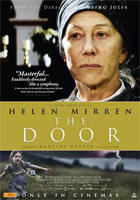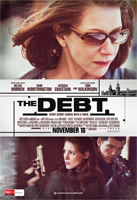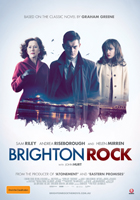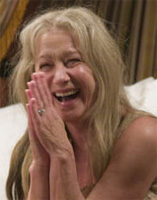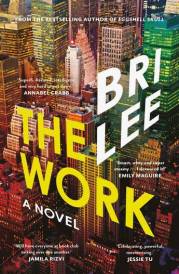Bryan Cranston Trumbo
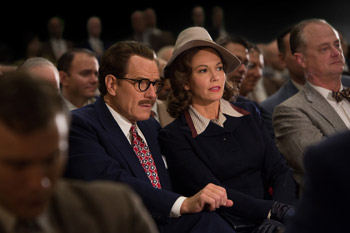
Bryan Cranston Trumbo
Cast: Bryan Cranston, Diane Lane, Helen Mirren, Louis C.K., Elle Fanning, John Goodman, Michael Stuhlbarg
Director: Jay Roach
Genre: Biography, Drama
Rated: M
Running Time: 124 minutes
Synopsis: Screenwriter Dalton Trumbo's acclaimed career comes to a crushing halt in the late 1940s when he and other Hollywood figures are blacklisted for their political beliefs. Directed by Jay Roach, TRUMBO recounts how Dalton used words and wit to win two Academy Awards and expose the absurdity and injustice under the blacklist, which entangled everyone from gossip columnist Hedda Hopper (Helen Mirren) to John Wayne, Kirk Douglas and Otto Preminger.
In the 1940s, Dalton Trumbo (Bryan Cranston) is one of the highest paid screenwriters in the world, penning movie classics including the Oscar-nominated Kitty Foyle and Thirty Seconds Over Tokyo. A fixture on the Hollywood social scene, and a political activist supporting labour unions, equal pay and civil rights, Trumbo and his colleagues are subpoenaed to testify in front of the House Un-American Activities Committee (HUAC) as part of its sweeping probe into communist activity in the US. Trumbo's refusal to answer the congressmen's questions lands him in a federal prison and earns him the eternal enmity of powerful anti-communist gossip columnist Hedda Hopper (Helen Mirren).
For the next 13 years, all of the major Hollywood studios refuse to hire Trumbo for fear of being associated with his perceived radical political views. Forced to sell his home and ostracised by friends, colleagues and neighbours, Trumbo struggles to feed his family by writing mostly low-budget movies under assumed names. But he never gives up fighting for what he believes in. Ultimately, Trumbo prevails when star Kirk Douglas and director Otto Preminger each put the screenwriter's real name on screen in their respective 1960 blockbusters, Spartacus and Exodus, effectively bringing the blacklist era to an end.
Trumbo
Release Date: February 18th, 2016
About The Production
In the wake of World War II, as relations between the U.S. and the U.S.S.R. deteriorated and the fear of the 'Red Menace" reached unprecedented heights, the House Un-American Activities Committee (HUAC) investigated tens of thousands of Americans suspected of being communist sympathisers.
HUAC paid special attention to Hollywood, convening hearings in October 1947 aimed at rooting out communists in the film industry. Scores of prominent actors, directors, producers and screenwriters were publicly berated about their association with an array of organisations deemed to be 'un- American." Threatened with the loss of their livelihoods, many witnesses gave evidence against friends and colleagues. Ten of those called to testify refused to answer any questions, denying the committee's right to ask them about their political beliefs and denouncing the hearings as a violation of their civil rights. All ten were sentenced to prison for contempt of Congress. The best known among them was Dalton Trumbo.
Born in the tiny Colorado town of Montrose, Trumbo came to Los Angeles in 1925 with his parents and sisters to find financial stability. His father's death made him the family breadwinner when he was only 21. He worked in a bakery, but his passion for writing drove him to produce articles and stories printed in Vanity Fair, the Saturday Evening Post and the Hollywood Spectator. Balancing financial responsibilities with his creative aspirations inspired a lifelong sympathy for working people and a deep understanding of the inequalities of class and privilege.
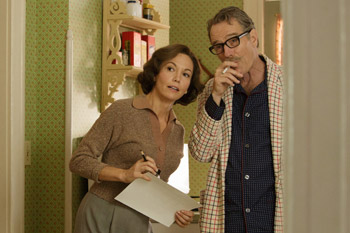 Signed to a screenwriting contract with Warner Bros., Trumbo's drive, determination and humour made him Hollywood's most successful screenwriter. But he is best remembered today as the most high-profile member of the 'Hollywood Ten."
Signed to a screenwriting contract with Warner Bros., Trumbo's drive, determination and humour made him Hollywood's most successful screenwriter. But he is best remembered today as the most high-profile member of the 'Hollywood Ten." Brilliant, ambitious and contentious, Trumbo enjoyed exposing what he perceived as the world's hypocrisy and injustices in his films, from Academy Award-winners Roman Holiday and The Brave One – both written under pseudonyms during his 13-year exile from Hollywood – to the blockbusters Spartacus and Exodus, which revitalised his career and marked the beginning of the end of the blacklist.
Screenwriter John McNamara first heard the story of Dalton Trumbo when he was studying screenwriting under formerly blacklisted scribes Ring Lardner Jr., Waldo Salt and Trumbo supporter Ian McClellan Hunter. 'I told Hunter how much I enjoyed his screenplay for Roman Holiday," McNamara says. 'He told me that he didn't write the script. Dalton Trumbo did."
Hunter realised that not only was McNamara unaware of the far-reaching impact of the HUAC hearings and the blacklist, so was the rest of the writing class. 'For the next two days, these men, who had lived through that era, told us the story from their point of view," McNamara remembers. 'When Ian suggested I read Bruce Cook's biography of Trumbo, I immediately did."
McNamara saw an opportunity to create a film that could encapsulate the turbulent politics of that volatile era in American history in a personal story. 'It's that rarest of things – a true story with a happy ending," he says. 'In Hollywood, we concoct happy endings to make up for the fact that there are so few in real life. This story got inside me and wouldn't let go, but I couldn't get what I saw in my head on paper until I came across an article written by Trumbo's eldest daughter, Nikola."
Reading that short, poignant essay, entitled 'A Different Childhood," McNamara realised he had been seeing his subject as a writer and a political activist, but he had no idea of the man. 'Niki's article showed me a person full of real flaws and contradictions. She wrote about what kind of father he was, what kind of husband and what it felt like to be part of his family when those subpoenas arrived. It opened a huge door for me."
As McNamara was beginning to discover, Dalton Trumbo was many things to many people. 'He was an outsider and an underdog," says producer Michael London, an early champion of the film. 'He was both a capitalist and a communist. Those kinds of contradictions make for a great character. More than anything, I loved his willingness to stand up to power and sacrifice his own career for the greater good. Trumbo hated bullies. He refused to tell people what they wanted to hear if it meant being disloyal to his friends. And he paid a tremendous price for that."
Eventually McNamara reached out to Niki Trumbo to get her insights and her opinion of his work-inprogress.
'She wrote back the most gracious email with very specific critiques of the script in general and her character in particular. I've never had such an instantaneous connection with anyone who ripped my work apart! She gave me cogent, insightful, emotional and logical notes that have really helped the screenplay be better in every way."
Niki Trumbo and her younger sister Mitzi became integral to the creation of the script. 'They are the last living members of the immediate family, so it was essential for us to have their full participation," says London. 'Early in development, we asked them for their comments and they gave us a tremendous amount of material. Major new story beats came out of those conversations. It was not always easy for them. The family endured such trauma and hardship, but Niki and Mitzi were both incredibly generous and devoted to helping us make the most truthful movie possible."
Niki is still fiercely proud and protective of her father's legacy. 'Trumbo is still known as a communist, but people don't realise that he was actually a patriot," she says. 'He was a communist in the late '30s and early '40s, when that meant you were pro-labour and anti-Jim Crow, and you fought for civil rights for African-Americans. It had nothing to do with Russia and everything to do with how an already great country could improve itself."
'He believed Congress had no right to compel him to give testimony about his political beliefs," she says. 'I think he was stunned to have lost that battle. This is a story about a man who held true to his own beliefs and principles. We can all aspire to be that kind of hero, whatever our flaws and weaknesses may be."
At Groundswell Productions, excitement was building for the project. 'It's one of the best scripts we ever read," says producer Janice Williams, the company's president of production. 'It didn't matter that it was a period piece with a huge cast and a subject that could be seen as -political.' We were so in love with it that no matter how hard it was we were going to do whatever it took to put the film together."
Williams describes TRUMBO as an unexpectedly vibrant movie about a very serious subject. 'It isn't a political film at all, but it is a story about the right to free speech. It's entertaining, interesting and full of amazing, real-life characters. We are portraying an incredible time in Hollywood history, both the beautiful, glamorous part of that world and the dark side, including the House Un-American Activities Committee."
ShivHans Pictures founder Shivani Rawat was drawn to the project by the incredible story, as well as Jay Roach and Groundswell Productions' involvement. 'As soon as I read the script, I knew we had to make this film," she says.
It is a larger-than-life tale of triumph over adversity that producer Monica Levinson found difficult to believe was true. 'Trumbo's story really breaks down to our right as U.S. citizens to free speech and assembly. Trumbo and the other blacklisters were not only denied those rights – but persecuted without having committed any crimes. Trumbo was a true patriot – he loved this country. But the system failed him." Rawat adds, 'His story is still relevant today, as the world in which we are living has many people facing too much intrusion from their government."
Director Jay Roach was tapped to helm the film early in the development process. Well-known for comedies including the Meet the Parents franchise, Roach had made a transition to more weighty fare including the HBO films Recount, a political drama about the controversial 2000 U.S. presidential election, Game Change, which centres on Sarah Palin's role in the 2008 presidential campaign, and the upcoming All the Way, an adaptation of the hit Broadway play with Bryan Cranston reprising his Tony-winning performance as Lyndon B. Johnson.
'Those films are about serious historical events," says Williams. 'Jay is very skilled at making true stories entertaining to watch. We wanted TRUMBO to be accessible and entertaining. I can't imagine a director who could have done that better."
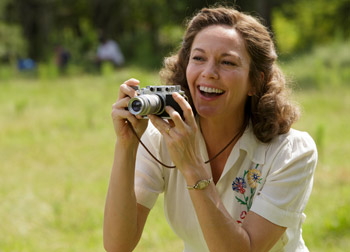 Rawat agrees. 'It was an honour to work with Jay because in my opinion he is one of the best directors working today. I knew he would do an amazing job handling such a sensitive story. Jay was the perfect person to carry on Trumbo's legacy by bringing his story and struggles to life."
Rawat agrees. 'It was an honour to work with Jay because in my opinion he is one of the best directors working today. I knew he would do an amazing job handling such a sensitive story. Jay was the perfect person to carry on Trumbo's legacy by bringing his story and struggles to life." Roach found the script an extremely compelling take on an important and fascinating story that needed to be told. 'I think most people have at least heard of the blacklist," says the director. 'They may even know the name Dalton Trumbo and be aware that he was a phenomenally successful screenwriter who was blacklisted in 1947 for his political beliefs. He was, in fact, the highest paid screenwriter in the world when he was blacklisted. He was talented, prolific and outspoken about what he believed. He could also be cantankerous and annoying and aggressive. On top of that, he was a communist – a very wealthy communist, which makes for a complicated and interesting story."
Roach was fully hooked once he began reading Trumbo's letters. 'His writing style is so captivating and sincere: deep and wise and funny," says the director. 'He was sometimes inconsistent and paradoxical but always irresistible. I wondered how a person this talented had gotten to a place where people thought he should be prevented from writing. One of the questions that I hope the film raises is how this very patriotic man, an artist who loved his country, could be seen as a traitor worthy of being sent to jail."
'The extensive interviews with the Trumbo sisters during development and filming ensured that the portrayal of the family was as authentic as possible," adds Roach. 'Niki inherited feistiness and a passion for ideas from her father, but that often put them in conflict. She talks about him with tremendous respect and admiration, but there was a lot of stress and strain on the family.
According to Mitzi Trumbo, Roach listened carefully to what the sisters had to say and made a number of adjustments to the script based on their input. 'A biopic is a complicated thing," she observes. 'You're seeing someone else's version of the life you actually led. Jay was extraordinarily sensitive. He was concerned about the same sorts of things I was. My father's story can be a lightning rod for many people and he wanted to make sure he told it truthfully."
What will make Trumbo's story resonate to a generation not familiar with the history of the Hollywood blacklist, says Brown, is that everything he was fighting against still goes on today. 'Even in America, and certainly in other parts of the world, people are being persecuted for what they believe," he says. 'The message of this movie is sadly still relevant today. Free speech is not yet a universal freedom."
Screenwriter McNamara calls Trumbo 'the most complex human being I've ever tried to render," adding: 'I miss him now that the film is done. I sure can relate to being a short-tempered writer who spends too much money, gets too far behind on deadlines and yells at his kids for interrupting him. But I'm not as brave as Dalton was. I don't know that I would go to prison for an ideal. I don't think there's another story quite like his in Hollywood."
After reading dozens of memoirs published about the blacklist by those who were there, he says that a comment from Arthur Laurents, the playwright, director and screenwriter, stays with him. 'It was the most poignant observation I came across. Laurents said that an entire generation of writers and directors, of actors, and producers of a certain political bent were suddenly silenced. But what if the blacklist hadn't happened? What would Trumbo have written with his name on it in 1955? What would Ring Lardner have written with his name on it? What would Michael Wilson have written?"
Many thousands of people in Hollywood and elsewhere were impacted by the blacklist, but Dalton Trumbo was one of the few with the talent, perseverance and personality to fight back successfully, according to Brown. 'He was willing to face the consequences," the producer says. 'There were a lot of other people writing under assumed names and using fronts, but they weren't fighting for a larger cause the way he was."
According to McNamara, it is no accident that Trumbo is the writer of Spartacus, a film about a gladiator who turns on his masters and leads his fellow slaves in rebellion. 'That film is the greatest collectivist fantasy ever produced by Hollywood," says McNamara. 'And it is a masterpiece, because it shows that collectivism might not be the dream in the end, but it's so much better than being a pawn in a game designed to enrich somebody else. I think what Trumbo was really saying in that film was if you have to die, die on your feet, die fighting and die together."
Playing Trumbo
Dalton Trumbo was a boisterous raconteur, a man who knew he commanded attention in every room he entered and enjoyed doing so. High living and high-minded, he was a bundle of fascinating contradictions that the filmmakers were anxious to portray accurately on screen.
The actor's breakout role on the long-running AMC series was not the only reason Roach wanted him to play Trumbo. 'Whether it's Breaking Bad or his Tony-winning turn as Lyndon Johnson [in Broadway's 'All the Way"] or even as the dad in Malcolm in the Middle, Bryan Cranston demonstrates an intensity that works for Dalton Trumbo," says Roach. 'He captures Trumbo's fire, intelligence and self-righteousness and manages to be as charming, entertaining and funny as the real man was."
London says he sees strong parallels between the actor and his subject. 'I think the character is Bryan in some really fundamental way. Bryan can be cantankerous, strong-minded and obsessive, as well as passionate about what he believes. Those are all the things that Dalton Trumbo was. Because of the mesh between actor and character, he brought an unfathomable love and appreciation of what Trumbo represented."
Cranston's whole-hearted embrace of the role made the character even more fascinating, in Roach's opinion. 'Bryan is amazing," the director continues. 'He found a way of capturing the performer in Trumbo while also keeping him real. It was an interesting choice and it distinguishes this performance from others in his body of work. Bryan's own strength and his creative instincts made it even more complex than I'd imagined."
After reading the script, Cranston decided that this was a project he could not wait to get involved in. 'Jay Roach provided such passion and guidance," the actor says. 'It has a strong script and a compelling story. It is thrilling and thought provoking from an intellectual standpoint. That attracted me and it attracted a cast that includes Diane Lane, Helen Mirren, John Goodman, Michael Stuhlbarg and Louis C.K., because we wanted to be part of something important."
Cranston says he considers three essential elements when he considers a role. 'The first thing is the story itself. Am I moved by it? Will I leave the theatre with some sense of improvement in my life? Even if it simply made me forget my troubles for two hours, that's a valuable two hours. The second thing is the text. Even the most phenomenal story needs to be told well. And then there's the character. And there's no question that this had all three of those things."
As when he played LBJ on Broadway, Cranston felt a responsibility to the man while playing the character. 'Dalton Trumbo's daughters were very helpful. Getting their perspective was invaluable, as were the biographies and autobiographies of people who knew him. There was an almost endless amount of source material. The more I learned, the closer I felt to his essence."
For anyone who wants to get to know Trumbo better, Cranston suggests watching the films he wrote. 'If you were to do a retrospective of his movies, there certainly isn't a subversive or dangerous message in them," says Cranston. 'He loved this country. He thought it could be even better. As he says in the movie, -We all have the right to be wrong.' Allowing each other the freedom to be wrong is the crux of Americanism."
'The common denominator in his films is that there's a character who chooses honour over selfadvancement, a character who fights for the righteous path," the actor notes. 'He felt he was a voice for the invisible person and that made him remarkable. But we also felt it was important to show that he was a human being. The pressure he was under could have destroyed his family and it's largely due to Cleo Trumbo's strength that it didn't."
'The toll his battle took on his family – and his wife's role in keeping the family intact – is an essential part of Dalton Trumbo's story," agrees Roach. 'For 13 years he was banned from working. He found an ingenious way to stay busy, but he was working 20 hours a day, propping himself up with stimulants and putting himself back to sleep with alcohol and prescription medication. The stress began to tear his family apart. Cleo held the family together and she did it with warmth and wit and deep commitment to her children."
The Trumbo Family
One of McNamara's most insightful decisions, according to Brown, was to focus the story on Dalton Trumbo's loved ones as well as the man himself. 'This is the first film that shows the impact of the blacklist on the other people involved," he says. 'You see the price that the entire Trumbo family paid for his political beliefs."
Trumbo's wife Cleo, a former child performer who supported her mother and brother as a youngster, was by all accounts a force to be reckoned with. She epitomised Hollywood glamour but also had the strength of character to stand up to her headstrong husband. When Cleo and Trumbo met, she was a carhop at a Hollywood drive-in where her talent for juggling water glasses made her a favourite with customers. Taken with both her beauty and her spirit, Trumbo quickly proposed. She turned him down flat and even returned the outsized tips he tried to leave her, but Trumbo's persistence eventually paid off and Cleo remained by his side throughout his ordeals.
'It was a very tumultuous life," says Williams. 'But she stood beside him because she believed in what he was doing. Diane Lane, who plays Cleo, embodies that kind of smart and sophisticated Hollywood woman."
The role of Cleo Trumbo was deceptively challenging to portray, according to London. 'Cleo was really the emotional anchor for Trumbo. She allowed her husband to get all of the attention. Diane is a very generous, giving actress, who recognised that she was going be playing second fiddle to Bryan, the way Cleo did to Dalton. She was not only comfortable with that, but she created a kind of stillness that represented what Cleo did in real life. She carries a lot of dramatic weight, but never in a showy way."
Cleo's strength came from the adversity she'd overcome during her tough show-business upbringing, says Lane. 'That gives her a very strong sense of survival. They say metal is strongest where it has been soldered and I think that applies to Cleo."
Although she had the looks and charisma to be a film star, says Lane, Cleo Trumbo chose to focus on being a wife and mother. 'She was very devoted to her husband and her children and her determination to protect them gave her strength."
Lane says that while she had heard of the Hollywood Ten and Trumbo, she learned much more while shooting the film. 'I became convinced that this story needed to be told," she adds. 'It's frightening how little history people, myself included, are aware of. The human drama behind it is shocking. This story will be relevant as long as patriotism can be hijacked by whatever group is in charge. That goes on all the time and what Cleo Trumbo had to say was that none of this needed to happen."
Producer Brown has been a fan of Lane's for a long time and was impressed with what she brought to the role of Cleo Trumbo. 'She's grown up to be one of the great actresses of our time," he says. 'She's just as beautiful and talented as you would hope. She took what was in the script and made it even better."
As witnesses to the trials Dalton Trumbo and his family endured, daughters Niki and Mitzi were critical to capturing what home life was really like for members of the blacklist. 'The fear of communism in the 1950s was so intense," Mitzi recalls. 'We never knew when we said the name Trumbo what the reaction would be. When I was in elementary school, the PTA started having secret meetings about communists in the neighbourhood and my parents in particular. I was taken out of school and tutored privately for a while. We were very close because of the situation. My parents always told us the truth, but we had to keep lots of secrets. I didn't have any other friends whose fathers had gone to jail. I could tell them that my father was a writer but not what he wrote."
McNamara had warned the sisters that specific moments in their lives might be fictionalised. 'In fact," says Niki, 'the story runs quite true to the events. They did a remarkable job of recreating the complexity and passion of my relationship with my father. He and I were, I think, very much alike – stubborn, very determined and challenging. It's no surprise we butted heads a lot of the time."
The real-life Niki Trumbo has high praise for Elle Fanning, the then 16-year-old actress who portrays her in a startlingly mature performance that takes the character from age 13 to a young woman. She and Fanning exchanged many emails during filming. 'Elle is so strong," she says. 'I wrote to her trying to explain how I felt at the time as a teenager, trying to find my own identity. She just really captures what I imagine I was like then. I almost felt like I was reliving it."
It became clear to Fanning through her contact with Niki Trumbo that everyone in the family were victims of the blacklist. 'They had to change their entire lives and live in secret," she says. 'Niki couldn't tell anyone who her dad was or what he did. There's already so much pressure as a teenager without adding to that, but she came out a fighter. Her sense of right and wrong saved her. That came from her father."
As the film illustrates, Dalton Trumbo was far from a perfect parent during this period. 'It was hard on the entire family," Fanning observes. 'He's blocking everything else out because he's so stressed. Niki gets very frustrated with him. Everything from friends to schoolwork to family life got put on the back burner. She couldn't hang out with friends because he needed her to type for him. She had to grow up pretty fast. She always respected him a lot, so it's very touching when they finally become close."
In their communication, Niki emphasised her love for her parents, says Fanning. 'She always called her mom Cleo and her dad Trumbo, rather than Mom and Dad. It seemed like a distancing thing, but Niki was very quick to say that it was really a term of endearment. They knew each other as equals, which explains a good deal about the family dynamic."
Throughout the film, Niki is the family member who challenges Trumbo the most. 'She demands that he be a father and a husband even if he feels like he is single-handedly taking on this injustice," says Roach. 'Elle has the strength to hold her own with Bryan Cranston in the same way. The character reminds you to root for the family during some stressful times and very heated battles."
Fanning found Roach's passion for the project inspiring. 'He was particular about every detail but very open to any questions or ideas. I remember saying that I wished we had paper hats for a scene celebrating Niki's 16th birthday. He made sure we had them. It was a priority for Jay to always make us comfortable."
A Powerful Enemy
Chief among Trumbo's adversaries is the legendary gossip maven, Hedda Hopper. A stage actress before becoming a contract player in silent movies, Hopper managed to make the transition to talkies, but her film career was not a glittering success. When the roles started drying up, she transferred her substantial energy into becoming a very successful Hollywood columnist with a large readership – and enormous power.
Although Helen Mirren topped the filmmakers' wish list for the role, producer Brown says they saw it as a long shot. 'She's Helen Mirren, for God's sake!" the producer exclaims.
'Helen is a consummate professional and all about the work," says producer Levinson. 'She was incredibly wonderful and you could tell everyone on set felt like we were in the presence of Hollywood royalty. She brought a very human element to Hedda Hopper, who essentially is the villain of the film."
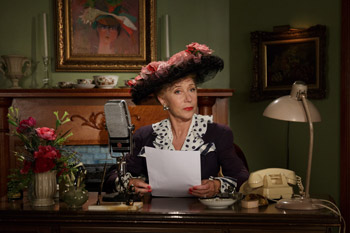 'It would be easy to underestimate Hopper's clout and conviction when it came to what she perceived as a communist threat within the U.S.," says Roach. 'She was known for wearing elaborate hats covered with flowers and feathers, yet she took on very serious issues in her gossip column. She marshalled the forces of anti-communism in Hollywood and came out strongly against Dalton Trumbo in particular. She was determined to convince America that these patriotic writers were traitors, and she wrote scathing, gossipy smears that were read by 35 million people."
'It would be easy to underestimate Hopper's clout and conviction when it came to what she perceived as a communist threat within the U.S.," says Roach. 'She was known for wearing elaborate hats covered with flowers and feathers, yet she took on very serious issues in her gossip column. She marshalled the forces of anti-communism in Hollywood and came out strongly against Dalton Trumbo in particular. She was determined to convince America that these patriotic writers were traitors, and she wrote scathing, gossipy smears that were read by 35 million people." Mirren was enthralled by the story and setting of TRUMBO. 'How interesting Hollywood was at that time," she exclaims. 'Hollywood was an extraordinary construct, fed by publicity, by the Hedda Hoppers and the Walter Winchells of the world, by the publicity agents and by the studios. There were titans abroad, all the great, great movie stars and filmmakers. I just loved this project."
Part of the attraction was the opportunity to work with Roach and Cranston. 'Jay Roach and Bryan Cranston are both people whose work I have admired for a long time," she says. 'Working with Bryan was like being with an old friend. Actors watch each other's work and we can develop certain little crushes on each other. Bryan has always been one of those actors for me."
'And Jay is so very encouraging, which is wonderful, especially when you're playing a flamboyant character like Hedda," Mirren says. 'You sometimes feel as if you're on the parapet about to fall off, so encouragement is very valuable."
According to Mirren, Hopper truly believed she was fighting for what was best for America and for ideals that many Americans believed in. 'Anything that smacks of socialism is absolute anathema. The political dialogue hasn't changed much. There is still a battle between those who believe that we have an obligation to look after people who are vulnerable and those who believe in individualism and self-determination."
Fellow Blacklisters
To represent the views and fate of some of the other members of the Hollywood Ten, McNamara introduced additional characters, including a composite called Arlen Hird, based on several of the other writers who were blacklisted. 'In the earliest drafts of the script, Arlen didn't exist," says Brown. 'We originally included characters more literally based on historical figures, but that took us off in too many directions. We needed someone to help move the story forward efficiently, so John created Arlen."
Hird is a composite of five communist screenwriters who knew Dalton Trumbo between 1947 and 1970: Samuel Ornitz, Alvah Bessie, Albert Maltz, Lester Cole and John Howard Lawson. 'What these five men all had in common," says McNamara, 'was each held harder, less flexible views of life and politics than Trumbo. While Trumbo was a committed radical with strong progressive beliefs, he also had a pragmatist's ability to see clearly that when one strategy was failing it was time to neither give up nor stay the course but change the strategy."
The character of Arlen Hird is played by comedian, actor, writer and director Louis C.K. 'Even in the middle of a dramatic story, you need to find comedy once in a while," says Roach. 'We cast Louis C.K. as a cynical, occasionally bitter, but often funny man who gets how screwed up what's going on really is and who can articulate it in a way that will make you laugh. He finds the absurdity in the situation in a way that some dramatic actors might not."
Hird represents a more militant form of communism than Trumbo, according to C. K. 'Arlen is a committed communist who went to Spain to support the revolution there," he says. 'Dalton Trumbo was an idealist with ideas about taking care of other people, about unions, collective bargaining and pay equity. A lot of the people who were blacklisted just went to meetings to talk about ideas, kind of like blogging, but they did it in person."
'The opportunity to explore an almost unimaginable moment in American history was intriguing," he says. 'People lost their jobs because they went to a meeting. My character is just a writer who wants to work. And I wanted to work with Bryan and Jay. Jay just says, -why don't we try it this way' and we all take a few cracks at it. He has a knack for creating funny and truthful moments."
In addition to Hird, McNamara included real-life screenwriter Ian McClellan Hunter, played by Alan Tudyk, to the story. Hunter was one of Trumbo's closest friends and valued associates. A successful screenwriter beginning in the late 1930s, as well as a communist and committed progressive, Hunter was not subpoenaed along with the Hollywood Ten. Consequently, he still managed to work as a screenwriter under contract to Paramount until 1950, when the Supreme Court's refusal to hear the Hollywood Ten's appeal for contempt of Congress concretized the blacklist.
Hunter is known for being the screenwriter credited for the beloved romantic comedy, Roman Holiday.
But in fact, it was Trumbo who gave his friend Hunter a copy of an extended screen treatment and allowed Hunter to take credit for it. The film would famously go on to garner much critical acclaim and attention, as well as an Academy Award for Hunter, although Trumbo was its actual author. In the mid-1950s, Hunter moved to New York City with his family and began writing for television under pseudonyms. As the blacklist began to unravel in the 1960s, he wrote for several acclaimed television series. As a professor at New York University in the 1980s, Hunter met John McNamara, enlightening the younger screenwriter on the blacklist and the story of Dalton Trumbo.
Unexpected Allies
John Goodman plays Frank King, a real-life figure who, with his brothers Herman (played by Stephen Root) and Maury, produced scores of grade-B gangster, horror, sci-fi and western pictures in the 1940s and '50s. 'The King brothers hire Dalton to write for them while he is blacklisted," says Williams. 'They don't care about politics. They don't care about anything but making money. But in their own strange way, they help undermine the blacklist by ensuring that banned writers stay employed."
'We were very, very lucky to get John Goodman to play this part," says London. 'It was so important to us that the movie was funny and entertaining. He plays Frank King in this really over-the-top, old Hollywood style. He plays the character with relish and gusto. He eats it up as Frank King and it never feels phony. That's what those guys were like."
Roach says King was an accidental hero of the era. 'He and his brothers hired blacklisted writers and got screenplays by some of the greatest writers in America for bargain prices. If that allowed them to make ends meet by writing under pseudonyms, it was an afterthought."
Goodman agrees that the brothers were not intentionally supporting the blacklisted writers. 'They were just trying make a buck," the actor says. 'They are bottom-line capitalists who want to spend as little as possible and reap high returns. They weren't looking for quality, just quantity. Ironically, Dalton Trumbo wrote a film for them called The Brave One under the name -Robert Rich' and it won an Oscar. These guys were at the bottom of the food chain and they won an Academy Award."
'Trumbo's story is still an inspiration today," says Goodman. 'It is about one man's courage standing up against the system. A lot of lives were ruined, including his and his family's, but he just kept fighting and he did it with impeccable grace and a lot of humour. It's almost impossible to believe that the blacklist existed or that people were that frightened of each other. It reminds us all to be vigilant and cherish the truth because it can happen again at any time."
John Wayne, Kirk Douglas And Edward G. Robinson
A story set during the Golden Age of Hollywood would not be complete without a roster of real-life figures familiar to generations of moviegoers. Actors John Wayne, Kirk Douglas and Edward G. Robinson loom large in Trumbo's story. 'It's hard to play or even cast the role of an actor who is that well known to audiences," says Williams. 'We didn't go for obvious look-alikes, but the actors we chose became so enmeshed with the characters that you absolutely believe them."
Finding an actor to fill John Wayne's boots was a particular challenge. The quintessential man's man and All-American hero, Wayne is one of the chief architects of Trumbo's downfall. As the head of the Motion Picture Alliance for the Preservation of American Ideals, he leads the charge to ferret out communist sympathisers who want to use movies to influence the American people.
The filmmakers cast 6'4", broad-shouldered and wholesomely handsome David James Elliott to play Wayne. 'John Wayne is an iconic part of American cinema history," says Roach. 'The idea of getting that wrong was terrifying. David James Elliott inhabited John Wayne without being a caricature of him or doing an impression."
Elliott watched Wayne's films and read extensively about the actor to prepare for the part. 'I have an enormous respect for the guy," he says. 'He was actually one of the more moderate people in the Motion Picture Alliance. It was a turbulent period of change all over the world. There was such fear of communism… It was easy to see the world in black and white, and Wayne thought he was doing the right thing."
'This was an amazing opportunity for me as an actor to work with a talented group of people," adds the actor. 'Jay is an awesome man and an actor's director – generous, kind and easy to be around. And working so closely with Helen Mirren was a delight. I was nervous about having so many scenes with an Oscar winner, but she's so warm and down to earth that she made it easy."
Edward G. Robinson shot to fame in 1931 as a ruthless criminal in Little Caesar, an early gangster chronicle that helped define the genre. In real life, Robinson was cultured, intellectual and politically minded. Never a communist himself, his progressive beliefs brought him into contact with many people who were.
Robinson was called to testify in front of the HUAC four times before he finally agreed to give up his friends' names. 'Edward G. Robinson is completely supportive of Trumbo and the other blacklisted writers in the beginning," says Roach. 'But he can't act under a pseudonym, so he does finally name names. It is a Faustian bargain. He ends up betraying his friends, the men he supported earlier in the story, just so he can go back to work. Like many of the other characters, he faces a moral dilemma of the most profound proportions."
Michael Stuhlbarg, who plays Robinson, was one of the filmmakers' earliest casting choices. 'Michael was a dream," says Rawat. 'With his stellar body of work, of course, his brilliance should have been no surprise. He studied Edward G. Robinson's films and all the material he could find. He was careful to play the man, not the famous characters he portrayed in his films. He really became Edward G. Robinson. He felt the pain and anguish of the man and as an audience member, you feel for him."
Although Stuhlbarg was familiar with Robinson's work, he knew nothing about the acclaimed actor's life. 'Once I did some reading, I was fascinated. His name was constantly turning up on lists of suspected communists, even though he never attended any meetings or joined the party. He felt a great need to clear his reputation."
McNamara found Robinson's dilemma heartbreaking and portrays the actor with great sympathy in his script. 'It was tough to write those scenes because I think he truly regretted it after he testified," he says. 'But rightly or wrongly, he felt he had no choice. Trumbo disagreed strongly. Trumbo always felt you have a choice to be decent, to do the right thing and to be brave."
In the end, says Stuhlbarg, 'There are no good guys or bad guys in this story. People do what they can to survive. It's a wickedly fast and dangerous life we live and we can learn a lot from Trumbo's bravery."
Kirk Douglas, played by Dean O'Gorman, is instrumental in helping put blacklisted writers, performers, directors and other entertainment professionals back to work when he hires Dalton Trumbo to write the script for his starring vehicle, Spartacus. At the apex of his career, the superstar is one of a few brave insiders who used their influence to force the end of the blacklist in Hollywood. 'John McNamara did a fantastic job telling the story," says O'Gorman. 'The script is so moving. It's funny, but with real heart and drama. Anyone who isn't familiar with it will be astounded. In its essence, it is about being true to yourself and having the courage to stand up for what you believe is right. That's what Dalton did, and it's what Kirk Douglas did, as well. They stood up at a time when it was dangerous to express their beliefs. That's as relevant now as it ever was."
With a wealth of material available on Douglas' life and work, including several memoirs by the actor himself, O'Gorman had more than enough research materials to flesh out the character. 'My challenge was to find the man behind the image," he says. 'I read everything he had written and I watched at least 25 of his movies. Jay and I agreed that I wasn't going to do an impression. Kirk has a distinctive voice, but my approach was not to try and sound like him, but to capture the essence of the man. He is known for his driving energy and that's what I sought to capture."
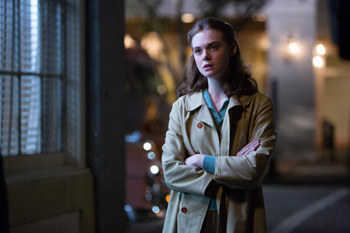 Given the Hollywood royalty portrayed in the film, the filmmakers were understandably concerned about the challenges casting might present, but it all came together, says Levinson. 'David Rubin, our casting director, did a magnificent job of finding the best possible cast for each role. And ultimately, Jay, the script, Bryan and Helen were such big draws that the biggest challenge became consolidating shooting days to make sure we could accommodate everyone's busy schedules. Meagan Lewis, our New Orleans casting director, also found us amazing local talent."
Given the Hollywood royalty portrayed in the film, the filmmakers were understandably concerned about the challenges casting might present, but it all came together, says Levinson. 'David Rubin, our casting director, did a magnificent job of finding the best possible cast for each role. And ultimately, Jay, the script, Bryan and Helen were such big draws that the biggest challenge became consolidating shooting days to make sure we could accommodate everyone's busy schedules. Meagan Lewis, our New Orleans casting director, also found us amazing local talent." The history of the blacklist era and its continued relevance today were also big attractions for all those involved, says Roach. 'We sometimes take our rights for granted. Free speech is easy to protect when we are saying things that are popular, but the Bill of Rights is designed to protect unpopular speech, especially in times of crisis. The blacklist era is almost forgotten, but everyone recognised that we had a singular chance to remind the world of the importance of this story."
Los Angeles, Louisiana
The dazzling world of Old Hollywood comes alive again through a wide variety of Louisiana locations that stand in for mid-century Los Angeles from the 1940s through the 1970s. TRUMBO was shot in 41 days: 40 in and around New Orleans and one in Los Angeles. 'The area has extraordinary period buildings that made it relatively easy to find the beautiful old bars and restaurants and office buildings we needed," says Williams. 'And the crew was very good. It was a great experience."
According to producer Michael London, 'Our goal was to make a movie on a pretty wide canvas. We needed a team of people who could realise Jay's vision of a movie that captured that old Hollywood glamour. There's great wardrobe and beautiful Southern California vistas, even though we shot in Louisiana. New Orleans has a lot of great mid-century architecture that hasn't been renovated the way it has in Los Angeles." Adds Levinson, 'In fact, we may have had more trouble finding these locations in the Los Angeles area, where the story takes place."
London says the most difficult location to find was the Lazy-T Ranch, the Trumbo family homestead during Dalton's heyday. 'We had to capture the bucolic nature of their life before he went to jail. And it had to have a lake, which Trumbo famously dug out for his children."
The ranch needed the feel of rural, mid-century California, which was difficult to replicate in the New Orleans area. 'Eventually, we found a beautiful property outside Covington, Louisiana, about an hour from New Orleans," says London. 'It had a wonderful, rambling house that really fit the bill with a beautiful backyard where we filmed a couple of memorable late-summer family barbecues. It really evoked the feeling of Ventura County, where the actual home was located. The only thing it didn't have was that lake, but there was a large pond nearby and with a little clever camera work and visual effects magic, we made it appear where we needed it to be. The overall effect is warm and romantic. It makes you realise how much this family lost."
The filmmakers also needed a stand-in for the Highland Park home the Trumbo's moved into after he was released from prison. A far more modest property in Northeast Los Angeles, the new house didn't have a lake, but it did have a swimming pool. Since the home they selected did not, Ricker created a faux pool in the backyard of the new Trumbo home from an 18-inch hole lined with blue tarp and carefully lit.
Other locations include the historic Longue Vue House, a New Orleans Classical Revival landmark transformed by Ricker into multiple settings including studio head offices; the homes of both Hedda Hopper and Edward G. Robinson; Hollywood's historic Roosevelt Hotel, where John Wayne addresses a meeting of the Motion Picture Alliance; the 1927 Saenger Theater, which hosts the premieres of Roman Holiday and Spartacus; and the U.S. Customs House, a landmark federal building used for a bittersweet scene between Arlen Hird and Dalton Trumbo, as well as the start of the infamous court hearings.
'We populated the sets with details that many audience members may not notice, but the actors on the set saw," says Ricker. 'Hopefully that helped the performances in some way. For example, Bryan discovered that Trumbo collected paintings by the social realist William Gropper, so we reached out to Gropper's family. His grandson Craig was kind enough to loan us a wealth of paintings, which we hung throughout the two Trumbo houses. Bryan was thrilled. At first he thought we'd found reproductions, but they're the real things."
The verisimilitude extended even to the posters and letterheads in the King Brothers production office. 'We tried to keep everything as authentic as possible within the realms of our budget and time frame," he says. 'It was a constant juggling act to provide sets that were rich in texture, but it benefits both the actors and the audience."
In addition to Ricker's meticulous period recreations, picture-car coordinator Michael Schlumbrecht made invaluable contributions to the vintage visuals with a fleet of more than two dozen antique automobiles that included old-time Chevys, Fords and Chryslers.
Roach also evoked the period by mixing his footage with archival films. 'We found incredible old footage of the House Un-American Activities hearings that originally appeared in newsreels," he says. 'We were able take some that we filmed ourselves and give it an old-time newsreel feeling so it could be merged with the original stuff. We recreated testimony by Trumbo and Edward G. Robinson that way. When you blend archival footage and contemporary film, it makes the story feel like it is rooted in something even more authentic. I think the audience likes to be taken back in time by the actual footage."
In a story that takes place from 1947 through 1970, costume, hair and makeup design are key to creating historical context. 'But an independent film like this can't have six hours of makeup every morning," says producer Williams. 'Our actors had to embody a lot of these changes in their own way. It was quite a journey trying to figure out all the periods, not just for our cast, but for our background actors as well."
That responsibility also fell to costume designer Daniel Orlandi, who collaborated with Roach for the fifth time. 'This was an amazing story for a costume designer because it spans several decades and is set in Old Hollywood," says Orlandi. 'It was great to work with the more glamorous looks of the '40s and '50s, but our work also encompasses people at home, in prison, in a sleazy Hollywood producer's office, on the a set of a gangster film and the set of Spartacus. It was daunting but really fun."
Bryan Cranston alone wore more than 60 costumes, according to Orlandi. 'His life goes from the height of his success to going to prison and to trying to scrape up money to keep his family afloat," he says. 'He has three different tuxedos and casual clothes and dressy clothes and pyjamas."
Orlandi scoured his sources for period items, but much of the wardrobe was created specially for the film from vintage fabrics, he says. 'I have a collection of vintage buttons and jewellery and feathers and flowers that we used to make Hedda Hopper's hats."
Hopper's flamboyant chapeaus were her trademark, and she was said to buy 150 new hats a year. Orlandi provided a new hat for each of Mirren's scenes. 'I have an incredible set of costumes and an amazing array of hats," says Mirren. 'I love hats and I used to wear hats much more than I do now. I made the huge mistake of wearing a hat to the Oscars the first time I was nominated, as if I was going to an English garden party. I looked ridiculous, but I enjoyed myself."
'I think Hedda's wardrobe was the most fun for Daniel," says Roach. 'He really did a phenomenal job with her character. It may seem like an exaggeration, but Hopper really dressed like that, and it's fantastic."
'Being so meticulous about period details for a film that spans four decades greatly complicated the filmmaking process," says London, 'but the rewards were worth it. There is so much in this story that is relevant to our lives today. The period element made the bar much higher for every element of the movie – the script, the casting, the director – because they all had to be undeniably right for the movie to work. That took time and patience. But it also meant that we wound up with the best possible material and the best possible team of people to see it through. Sometimes being held to a higher standard is a useful challenge that brings out the best in everyone."
Adds Levinson, 'Makeup and hair presented its own set of challenges as we had to span the years 1947-1970. Jay worked with our talented team led by Luisa Abel and Kelvin Trahan to make sure we could achieve it all at the highest quality. Everyone in the cast and crew rose to the occasion to deliver their very best despite the extremely hot New Orleans weather and indie film shooting schedule."
'The movie has a pretty simple message: stand up for yourself and what you believe in," says London. 'In Trumbo's case, that meant sacrificing things that he held dear – his job, his lifestyle, his ability to provide comfortably for his family. Most of us don't have to ever make those choices. The movie asks each of us, -What would you do?' That's an important thing to ponder."
Mitzi Trumbo is pleased to see her father's story told in its entirety. 'It's important to know that people like Trumbo have made great personal sacrifices for what they believe." she says. 'On the set, so many actors and crewmembers told me how much they admired him and how proud they were to be involved in the film. One of the most unforgettable moments for me was on Halloween when most of the crew showed up wearing Trumbo moustaches and glasses."
In Roach's opinion, that respect and admiration is well deserved. 'Dalton Trumbo was an American patriot, but his defence of our freedom of speech made him a traitor in some people's eyes," he says. 'One of the great questions that the film asks is how we as a country got to a place where it seemed right to send someone like Trumbo to jail and prevent him from writing. That question is important at a time our country is more polarised that I can remember in my lifetime. It is about something fundamental to how we proceed as a country. Free speech is easy to protect when we are saying things that are popular, but the Bill of Rights was designed to protect people who are saying things that aren't. Trumbo said it over and over again"it's the essence of the democratic experiment."
Trumbo
Release Date: February 18th, 2016
Have You Seen This?
MORE
- Mission: Impossible Fallout
- Glenn Close The Wife
- Allison Chhorn Stanley's Mouth Interview
- Benicio Del Toro Sicario: Day of the Soldado
- Dame Judi Dench Tea With The Dames
- Sandra Bullock Ocean's 8
- Chris Pratt Jurassic World: Fallen Kingdom
- Claudia Sangiorgi Dalimore and Michelle Grace...
- Rachel McAdams Disobedience Interview
- Sebastián Lelio and Alessandro Nivola...
- Perri Cummings Trench Interview


